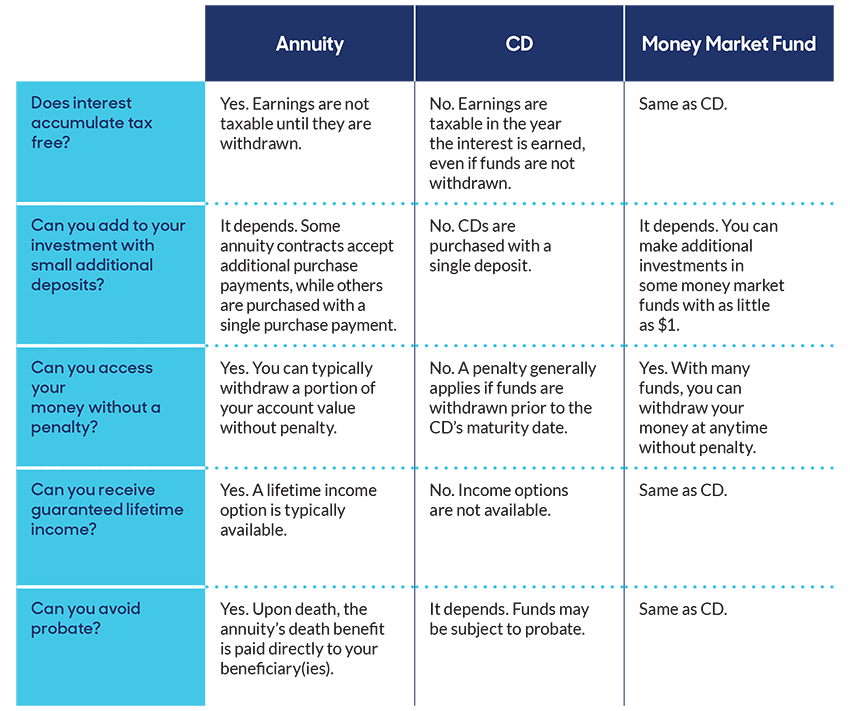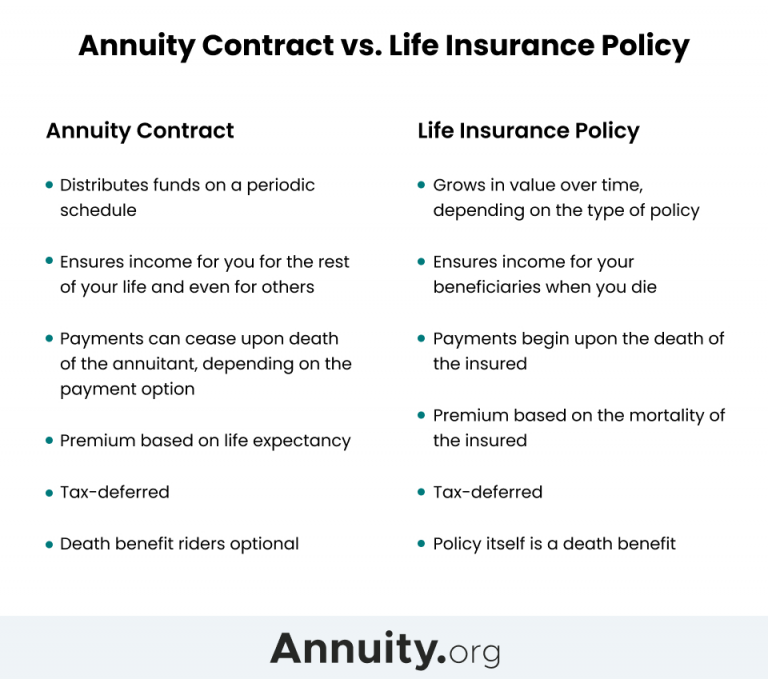All Categories
Featured
Table of Contents
There are 3 sorts of annuities: fixed, variable and indexed. With a fixed annuity, the insurance provider assures both the price of return (the rate of interest) and the payment to the financier. The passion price on a repaired annuity can alter in time. Commonly the interest rate is dealt with for a number of years and afterwards modifications periodically based on current prices.
With a deferred fixed annuity, the insurance coverage firm consents to pay you no much less than a specified interest rate as your account is expanding. With a prompt fixed annuityor when you "annuitize" your postponed annuityyou receive an established fixed amount of cash, typically on a month-to-month basis (comparable to a pension plan).
And, unlike a repaired annuity, variable annuities don't provide any type of assurance that you'll earn a return on your investment. Rather, there's a threat that you could actually shed cash.
Breaking Down Your Investment Choices Everything You Need to Know About Variable Annuity Vs Fixed Annuity Defining Fixed Vs Variable Annuity Pros Cons Advantages and Disadvantages of Variable Vs Fixed Annuity Why Annuities Variable Vs Fixed Can Impact Your Future Fixed Vs Variable Annuities: Simplified Key Differences Between Different Financial Strategies Understanding the Rewards of Fixed Annuity Vs Variable Annuity Who Should Consider Annuities Fixed Vs Variable? Tips for Choosing What Is Variable Annuity Vs Fixed Annuity FAQs About Planning Your Financial Future Common Mistakes to Avoid When Planning Your Retirement Financial Planning Simplified: Understanding Tax Benefits Of Fixed Vs Variable Annuities A Beginner’s Guide to Smart Investment Decisions A Closer Look at How to Build a Retirement Plan
Due to the complexity of variable annuities, they're a leading source of capitalist issues to FINRA. Prior to getting a variable annuity, thoroughly checked out the annuity's prospectus, and ask the person selling the annuity to discuss all of the product's features, cyclists, costs and constraints. Indexed annuities generally use a minimal surefire passion rate combined with a rate of interest price connected to a market index.
Recognizing the attributes of an indexed annuity can be complex. There are numerous indexing methods companies utilize to determine gains and, due to the selection and complexity of the methods made use of to debt interest, it's challenging to compare one indexed annuity to an additional. Indexed annuities are generally classified as one of the following 2 kinds: EIAs use an ensured minimum rates of interest (typically at the very least 87.5 percent of the costs paid at 1 to 3 percent rate of interest), as well as an additional rates of interest connected to the performance of several market index.

With variable annuities, you can invest in a selection of securities consisting of stock and bond funds. Stock market performance determines the annuity's worth and the return you will obtain from the cash you spend.
Comfortable with variations in the securities market and desire your investments to equal rising cost of living over an extended period of time. Young and desire to prepare monetarily for retired life by enjoying the gains in the supply or bond market over the long term.
As you're developing your retirement savings, there are many ways to stretch your money. can be specifically valuable financial savings devices due to the fact that they assure an income amount for either a set time period or for the remainder of your life. Dealt with and variable annuities are 2 options that provide tax-deferred growth on your contributionsthough they do it in various methods.
Understanding Financial Strategies A Comprehensive Guide to Investment Choices What Is Annuity Fixed Vs Variable? Pros and Cons of Pros And Cons Of Fixed Annuity And Variable Annuity Why Choosing the Right Financial Strategy Is Worth Considering How to Compare Different Investment Plans: Simplified Key Differences Between Variable Annuity Vs Fixed Indexed Annuity Understanding the Rewards of Long-Term Investments Who Should Consider Annuities Fixed Vs Variable? Tips for Choosing the Best Investment Strategy FAQs About Indexed Annuity Vs Fixed Annuity Common Mistakes to Avoid When Planning Your Retirement Financial Planning Simplified: Understanding Your Options A Beginner’s Guide to Fixed Vs Variable Annuity Pros And Cons A Closer Look at Annuity Fixed Vs Variable
An offers a guaranteed interest price. Your contract worth will boost due to the accrual of ensured interest revenues, indicating it won't shed worth if the market experiences losses.
An includes bought the securities market. Your variable annuity's financial investment performance will certainly affect the dimension of your savings. It might ensure you'll receive a collection of payouts that begin when you retire and can last the remainder of your life, offered you annuitize (begin taking repayments). When you start taking annuity payments, they will certainly rely on the annuity value at that time.
Market losses likely will cause smaller payments. Any type of rate of interest or other gains in either sort of contract are sheltered from current-year taxes; your tax obligation will come when withdrawals begin. Let's check out the core functions of these annuities so you can choose exactly how one or both might fit with your total retired life approach.

A fixed annuity's worth will not decrease because of market lossesit's regular and stable. On the other hand, variable annuity values will certainly fluctuate with the performance of the subaccounts you elect as the marketplaces fluctuate. Earnings on your taken care of annuity will extremely rely on its acquired price when purchased.
On the other hand, payout on a taken care of annuity purchased when passion rates are reduced are most likely to pay out earnings at a reduced price. If the rate of interest is ensured for the size of the agreement, revenues will continue to be continuous regardless of the markets or rate activity. A set rate does not indicate that repaired annuities are risk-free.
While you can't come down on a set rate with a variable annuity, you can choose to buy conventional or hostile funds tailored to your risk level. Much more traditional investment alternatives, such as short-term mutual fund, can help lower volatility in your account. Considering that taken care of annuities use a set price, reliant upon present rate of interest rates, they don't offer that exact same versatility.
Highlighting the Key Features of Long-Term Investments A Closer Look at Variable Annuities Vs Fixed Annuities Defining Variable Annuity Vs Fixed Indexed Annuity Pros and Cons of Choosing Between Fixed Annuity And Variable Annuity Why Annuities Variable Vs Fixed Is Worth Considering Fixed Income Annuity Vs Variable Growth Annuity: A Complete Overview Key Differences Between Deferred Annuity Vs Variable Annuity Understanding the Key Features of Long-Term Investments Who Should Consider Fixed Index Annuity Vs Variable Annuity? Tips for Choosing Fixed Vs Variable Annuity Pros Cons FAQs About Planning Your Financial Future Common Mistakes to Avoid When Planning Your Retirement Financial Planning Simplified: Understanding Your Options A Beginner’s Guide to Deferred Annuity Vs Variable Annuity A Closer Look at How to Build a Retirement Plan

Of the its guaranteed development from built up interest payments stands apart. Taken care of rates of interest use small development in exchange for their guaranteed earnings. You potentially might make much more lengthy term by taking added threat with a variable annuity, yet you can likewise lose cash. While fixed annuity contracts stay clear of market threat, their trade-off is less growth capacity.
Investing your variable annuity in equity funds will supply more prospective for gains. The costs associated with variable annuities may be greater than for other annuities.
The insurance firm might enforce abandonment costs, and the Internal revenue service may levy an early withdrawal tax fine. They start at a specific portion and then decrease over time.
Annuity earnings go through a 10% early withdrawal tax charge if taken prior to you get to age 59 unless an exception uses. This is imposed by the IRS and puts on all annuities. Both dealt with and variable annuities offer choices for annuitizing your equilibrium and turning it into a guaranteed stream of life time income.
Highlighting the Key Features of Long-Term Investments A Comprehensive Guide to Investment Choices Defining the Right Financial Strategy Features of Smart Investment Choices Why Choosing the Right Financial Strategy Matters for Retirement Planning How to Compare Different Investment Plans: How It Works Key Differences Between Different Financial Strategies Understanding the Key Features of Long-Term Investments Who Should Consider Deferred Annuity Vs Variable Annuity? Tips for Choosing the Best Investment Strategy FAQs About Pros And Cons Of Fixed Annuity And Variable Annuity Common Mistakes to Avoid When Choosing a Financial Strategy Financial Planning Simplified: Understanding Your Options A Beginner’s Guide to Smart Investment Decisions A Closer Look at How to Build a Retirement Plan
You might determine to use both dealt with and variable annuities. Yet if you're picking one over the other, the differences issue: A may be a far better alternative than a variable annuity if you have a much more conservative danger tolerance and you look for foreseeable rate of interest and major security. A may be a far better alternative if you have a greater danger resistance and desire the potential for long-term market-based growth.
Annuities are agreements offered by insurance provider that promise the purchaser a future payment in normal installments, normally monthly and frequently forever. There are different kinds of annuities that are designed to offer different objectives. Returns can be taken care of or variable, and payments can be prompt or deferred. A fixed annuity guarantees payment of a set amount for the regard to the arrangement.
A variable annuity changes based on the returns on the common funds it is invested in. A prompt annuity begins paying out as quickly as the customer makes a lump-sum settlement to the insurance provider.
An annuity that provides guaranteed income for life (or beyond, for your beneficiary) additionally ensures you that also if you diminish their other assets, you will still have some earnings coming in. Annuities' returns can be either fixed or variable. Each kind has its pros and cons. With a repaired annuity, the insurance provider ensures the buyer a details repayment at some future date.
Table of Contents
Latest Posts
Decoding Deferred Annuity Vs Variable Annuity Key Insights on Your Financial Future Breaking Down the Basics of Investment Plans Advantages and Disadvantages of Different Retirement Plans Why Indexed
Exploring the Basics of Retirement Options A Comprehensive Guide to Fixed Vs Variable Annuities Defining the Right Financial Strategy Advantages and Disadvantages of Pros And Cons Of Fixed Annuity And
Highlighting the Key Features of Long-Term Investments Key Insights on Your Financial Future Breaking Down the Basics of Investment Plans Features of Smart Investment Choices Why Annuity Fixed Vs Vari
More
Latest Posts